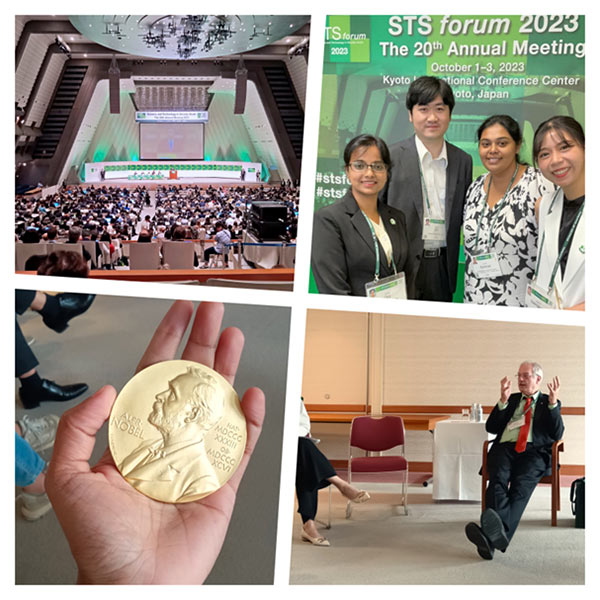Events
Bidisha Dey
Report on the young leaders’ program and STS forum 2023
The 20th Science and Technology in Society forum and the Young Leaders Program was held in Kyoto from 30th September to 3rd October this year. I was one of the lucky five selected from the Sakura Science Club (SSC) to participate in the Young Leaders Program and the subsequent STS forum. The overall experience was overwhelming, intimidating and empowering at the same time, over the three and a half days. The SSC participants were some of the youngest and earliest in our careers compared to the rest of the 150 young leaders from diverse backgrounds in academia, technology, business, politics and more.

The first day started with a lunch and networking session between young leaders where we met people from various backgrounds from all around the globe. We were then invited have an open discussion with two Nobel laureates. My group (~10 people) were fortunate to talk to Prof. Klaus Von Klitzing who won the Nobel Prize in physics in 1985 for his discovery on quantum Hall effect, and Prof. Morten P. Meldal who got the Nobel prize in chemistry in 2022 for his discovery on ‘click chemistry’. It was an incredible experience being able to converse with the two eminent scientists and getting to hear their views on various topics of science, society, and life in general. Both of the Nobel laureates had the view that as scientists we should pursue science without thinking about achievements. Both admitted that their Nobel winning discoveries were accidental and not the goal of their research at the time. It was also assuring to hear that like many of us, they also suffered hardships in their early careers in terms of uncertain job prospects, inadequate funding and research opportunities, but persevered and continued their commitment to scientific research. Prof. Klitzing shared his views on the funding of science, arguing that a sudden increase in government funding for society's burning issues is not the solution to societal problems, but that funding needs to be increased gradually along with other infrastructure and public trust in science to benefit society. Prof. Meldal opined that teaching chemistry to children from an early age would help them understand the interrelationships between nature and society and the human impact on nature. He also offered valuable insights into the management of research groups and how to conduct efficient collaborative research without laboratory competition. He shared his views on scientific publication, stating that papers must be published based on the importance of the findings and not just for the sake of publication. Both Nobel Laureates brought their medals with them, and we were lucky enough to hold them in our hands.
The first day also included the Regional Action on Climate Change (RACC 15), which addressed many burning issues on mitigation and adaptation to climate change. One of the prevailing opinions of the experts was that adaptation to climate change needs to be the primary focus of the hour, rather than mitigation, in order to support the most vulnerable populations, as mitigation efforts will take decades to show their results, while the climate disasters have already begun and are affecting society.
The main events of the STS forum began on 1st October and included several plenary and concurrent sessions. The concurrent sessions were held in eight different rooms focusing on various topics of climate change, energy, education, diversity, digital society, artificial intelligence etc., and were held in a round-table discussion format with 1-2 panellists at each table along with other participants. The sessions opened with short speeches from the panellists, followed by ~40 minutes of discussion around the table on the main topic, summarised by one person from each table and reported back to the chair and the rest of the participants. It was an incredible experience to be able to participate in this round table discussion with the leading experts of various fields during these sessions. The events also included a special buffet dinner at the Ninna-Ji Temple, where we were entertained by a traditional dance performance by the well-known Geiko and Maiko of Kyoto. The following day concluded with an official dinner and a mesmerising live performance by the famous pianist Hayato Sumino.







